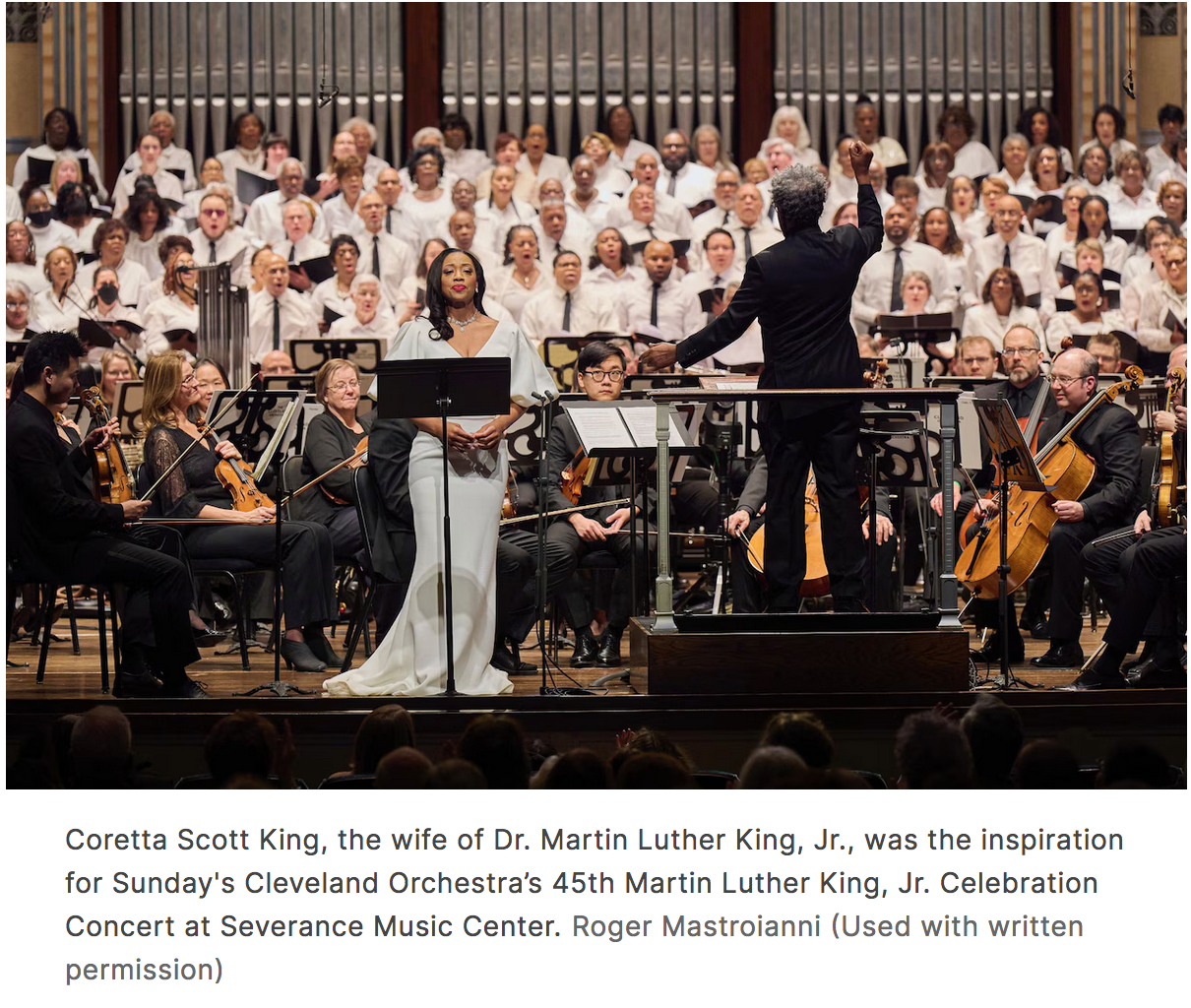by Kevin McLaughlin

CLEVELAND, Ohio — Coretta Scott King, the wife of Dr. Martin Luther King, Jr., was the focus and inspiration for The Cleveland Orchestra’s 45th Martin Luther King, Jr. Celebration Concert, held at Severance Music Center on Sunday, January 19.
Outstanding performances by conductor Daniel Reith and The Cleveland Orchestra, soprano soloist Laquita Mitchell, conductor Dr. William Henry Caldwell and the Martin Luther King Celebration Choir, and graceful narration by Aseelah Shareef helped to cast refreshing new light on the great Civil Rights leader, author, wife, and mother.
The orchestra and chorus, augmented by audience participation, opened with Lift Every Voice and Sing, J. Rosamond Johnson’s setting of a poem by his brother, James Weldon Johnson. Also known as “the Black National Anthem,” the hymn never fails to uplift, and on Sunday the rousing performance had extra magic. Indeed, this was an audience that was excited to be in attendance. Following a staid performance of Samuel Coleridge-Taylor’s Ballade in A minor for orchestra, a loud “Yeah!” was heard before the applause began.
Shareef’s narration was as eloquent and intelligent as the evening’s honoree herself. Chronicling Scott King’s life and activism, Shareef reminded us of her independent spirit. “She was a Scott before she was a King!”
When Scott met her future husband, she was a voice student at New England Conservatory in Boston. She conducted choirs and sang spirituals — such as those conducted on Sunday by Dr. Caldwell and performed beautifully by the 150-voice Chorus.
Gounod’s sacred anthem O Divine Redeemer, the soprano solo Laquita Mitchell enthralled her audience with on Sunday night, may also have been in Scott’s repertoire.
Mitchell possesses a voice of lush loveliness and warmth. Though the orchestra covered her a bit in her middle register, in the Gounod and later in Florence Price’s Hold Fast to Dreams and Undine Smith Moore’s Love, Let the Wind Cry, she communicated the thrilling wonder of the music and words.
Adolphus Hailstork’s Epitaph for a Man Who Dreamed, premiered in 1980, twelve years after King’s assassination in Memphis, evokes the style of spirituals without quoting any directly. The string orchestra seems not to reflect the tragedy of King’s death but to offer the vision of a world he imagined during his life.
The musical climax came with Valerie Coleman’s Umoja, Anthem for Unity. Umoja, Swahili for “unity,” is a marvelously buoyant score, ingeniously orchestrated with a wide assortment of percussion instruments. It was heartening to hear Shareef describe Coretta Scott King’s unshakeable spirit, even after the events of April 4, 1968, and to hear that spirit reveal itself in a recording made after King’s assassination in which she said that her commitment to the work of civil rights was even larger than Martin’s. “They may have killed the dreamer, but they will never kill the dream.”
Prior to the performance, recipients of the Dr. Martin Luther King, Jr. Service in the Arts Awards were announced: Richard K. Levitz, Hispanic architect and arts advocate, Dr. David M. Thomas, music director and educator, and Benjamin Smith’s Splice-Cream Truck, a mobile recording studio that connects communities through sound.
Photos by Roger Mastroianni
Published on ClevelandClassical.com January 23, 2025
Click here for a printable copy of this article


